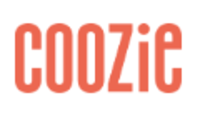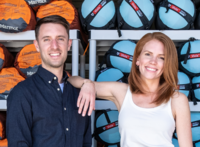Monday, May 6, 2019
Interview with Rachelle Snyder and Ross Richmond, Coozie

If you'd like to get out into the outdoors in the latest and greatest gear—especially, if you've never done it before--it's usually a pretty expensive proposition. It's costly to buy the best tents, sleeping bags, and other gear. Not to mention, you have to have a place to store all that stuff, and who knows if you'll use it again? To fix that problem, Los Angeles-based Coozie (coozieoudoors.com) offers up a different option—a way to rent gear at a fraction of purchase price. The company is backed by Los Angeles-based startup studio Science Inc. We caught up with co-founders Rachelle Snyder and Ross Richmond to learn more about what the company is working on, and why Coozie thinks it has the solution to allowing anyone to get an outdoor experience.
What do you do?

Rachelle Snyder: Coozie is an outdoor experience company. We partner with premium outdoor brands, and rent equipment at 15 percent of the retail price. We make it super, super easy for experiential consumers to access the outdoors.
How'd you start the company?
Rachelle Snyder: We started this a couple of years ago, out of our own personal pain point. We had moved from Boston to Los Angeles, and shucked all of our outdoor gear in the process. In LA, we wanted to do tons of experiences in the outdoors, but we literally had no interest in owning gear. We were living in a 600-square-foot bungalow, and we had no place to store it. That's how we came upon this problem we were facing. We got the idea when we figured out there were no real brands for rental, no one was doing this really well, and figured that we should do it. We started with just a few tents, and saw an immediate consumer demand, and we've grown steadily from there. We now have a 6,000 square foot warehouse, and we're growing every day.
How did you connect with Science?
Ross Richmond: This summer, we decided to seek investment, so we could grow and meet the consumer demand we were seeing. We went out and started interviewing different VC funds, and loved the experience we had with Science. They wanted to bring us on as one of their portfolio companies, so we jumped at the opportunity. They have great experience and real deep history, and they're one of the core investors in growth startups in LA.
What's the advantage of renting, rather buying your own gear?
Ross Richmond: Every is a little different. For many people, storage is the issue. They are in an apartment, and they're paying for square footage, and have no closet space. It's a no brainer to have something they can have at the ready to rent when they need it. It's out of their square footage. There is also the maintenance side of it. Gear gets dirty, and you have to do maintenance on the poles of tents if they break, and lots of people feel like that's something that someone else can do for them.
Rachelle Snyder: The last piece, if the finances and investment in gear. Our experiential consumer doesn't want to go to an outdoor retailer, and have to go pay $1000 or $1500 for outdoor gear. We allow them to get access to that gear at a fraction of that price. That's the biggest thing. I think, across the board, and not just in the outdoors industry, that's the case. There are many other companies that are shifting their models from retail-driven to an experience-focused model. That's what we're doing with Coozie.
Ross Richmond: We really had a light bulb moment around that when we first started. We had a customer at REI, and they were calling us from the store. He had figured out that he would need to spend over $1000 in gear to go camping, because he had been invited by colleagues from work. We told him, you don't need to buy that, we have a great option for you. He felt like a rock star, because he had really high quality gear he could show off to his colleagues, and didn't have to buy it. Everything we have is very well maintained. We handwash the tents and sleeping bags when they come back. It's really a no-brainer. You're never going to have to worry about being invited to go out to try backpacking. Some of the other stories we have heard are very similar to that. A parent reaches out to us because their kid has joined Boy Scouts, and they need gear, but they may not want to keep doing that past the summer. There's no option that solves this now for these folks well, which manages these problems of storage, maintenance, and price.
When did you start offering this up as a service?
Rachelle Snyder: We started this almost two years ago, testing this in Los Angeles. We launched with a very small number of items. We started testing this with just three tents, and grew it from there. Now, we're national, and can ship anywhere in the U.S. Any customer or user across the country is able to rent their gear at Coozie Outdoors. We ship with a free return label, and when they're done, they ship it right back. We're building Coozie to make going outdoors as an option even easier.
How does your business handle the wear and tear on the gear?
Ross Richmond: That's something we've test over a year and year and a half. We were trying to figure out, is this going to work from a business model standpoint? It turns out, it works very well. Customers take very good care of our gear. We put a lot of gear through our test, trying a lot of different gear, which is premium and lightweight but durable. The averages are really good for us in terms of how many turns we can get on the gear. At the end of the day, you need gear you can trust and that will hold up, but also really is a premium experience. Once things start to feel used or tired, we don't want to give them to customers. It's like when you walk into a hotel room, you want to feel like you're the first one in the room. Everything needs to be meticulous, the sheets need to be turned down, the wastebasket and the bathroom need to be clean. That's the same feeling and experience you get with our gear. We have a year and a half of data, and feel really good about our business model for that question.
What were you two doing before starting the company?
Rachelle Snyder: I actually started by career in the education field, where I worked for almost a decade. I worked for an ed-tech startup, and then got my masters at UPenn in entrepreneurship. It was the startup and entrepreneurship Masters mixed with growing up in the outdoors, and going camping, which drove me to this path.
Ross Richmond: My background is public policy and nonprofit work. It's quite different than this. I was doing some entrepreneurial work in the relief space, figuring out how to get extra food from universities to people in need in the Boston area. I created a program to do that, which is where I got my bug for figuring out logistical challenges.
Finally, what are you working on now?
Rachelle Snyder: We are launching across the country, making sure we can meet consumer demand. We're constantly getting requests for new gear and different types of gear. We want to make sure we are able to meet what customers want on our platform. We are striving take feedback and requests, and implement them into our business model, so we can grow.
Ross Richmond: Additionally, we're working on the customer experience on our website. We're really exited to walk customers through gear suggestions, based on what they are doing, and figuring out their experience level, and providing advice from experts. If some folks are just dabbling in this, and only go outside occasionally, we find they need some hand holding and have lots of questions. They chat with us a lot, and that's a great form of feedback, so we're constantly excited about that. As we lower barrier of entry and make gear more accessible, it's about supporting customers in the process of getting outside.
Thanks!